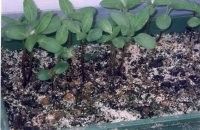Isoperl G
Isoperl®-G 2, Isoperl®-G 5 for ecological gardening

Isoperl®-G for use in the agricultural sector. The special structure of the individual Isoperl® grain is produced from the natural stone, perlite, without chemical additives which results in a balanced ratio between open and closed cells. Isoperl®-G is found in growing vegetables, plants and herbs, often used neat as a substrate without soil, whereby growing takes place in grow-bags or plant containers filled with Isoperl®-G.
Effect:
Isoperl®-G ensures health plant growth. With its high water absorption capacity and simultaneous high air pore content, Isoperl®-G allows sufficient oxygen supply and an optimal, even water saturation without producing waterlogging (prevents excess salt).
Special applications areas are gardeners who prefer to use Isoperl®-G for cutting reproduction and soil loosening.
Isoperl®-G in an appropriate ratio to plant soil - up to 50% in extreme cases - and possibly N-P-K fertiliser increase growth and the general condition of the plants.
- Pure, environmentally-friendly natural product
- Strong shoots
- Healthy cuttings
- Pleasing growth
- A natural mineral - free of germs
- 55-65kg/m³, 80-90 kg/m³
- With a pH value of approximately 7 neutral
- Water storing and soil airing
- Prevents waterlogging and is compatible with any soil
- No plant and animal endangering fungi and bacteria
- Resistant to frost and temperatures
- Regulates released nutrients
- Supports fine root growth
- Reduces repotting shock
- Long-term soil improvement
- Areas of application
- Gardening and landscaping
- Roof gardens and roof greenery
- Sport and golf courses
- The plants at each stage of growth
- Vegetable, verb and flower cultivation
- Growth aid when planting trees
- Loosening of plant soil
- Plants in tubs and balcony boxes
- Aggregate for improving potted and container plants
- Interspersing for quick composting
Application recommendations:
| Application areas | Added to plant soil in % |
|---|---|
| Open land cultures | |
| e.g. vegetables, strawberries, herbs, summer flowers | 10 - 15% |
| shrubs, ground covers, vines, berries, tree school cultures | 20 - 25% |
| Glass cultures | |
| Vegetables and cut flowers | 10 - 20% |
| Substrate mixing | |
| Balcony boxes, plant tubs, planted soundproofing walls | 30 - 40% |
| Cultivation of young plants | 25 - 30% |
| Potted plants with low soil air requirements | |
| e.g. hydrangeas, potted chrysanthemums | 20 - 30% |
| Potted plants with high soil air requirements | |
| e.g. ferns, green plants and cyclamen | 30 - 35% |
| Bedded plants | |
| Bedded plants | 30 - 40% |
| e.g. rhododendrons, azaleas, heather, flower soils | 30 - 50% |
| Surface application | |
| new grass (including sport lawns, roof gardens etc.) | 20 - 40% |
| Grass base layers, reduced | 10 - 20% |
| Tree planting | 15 - 25% |
| Ground covers, shrubs, soil improvement | 20 - 25% |
| Substrate mixing | |
| Grass base layers Forced mixing acc. to DIN 18035/4 |
15 - 25% |
| Light substrates for plant tubs with turf and compost | 20 - 30% |
| with light to medium soils | 20 - 25% |
| >with heavy soils | 25 - 30% |
| Plant hole treatment | |
| Added per 10 l of soil removal | 30 - 50% |
Typical chemical analysis
| SiO2 | 60-80% |
|---|---|
| CaO | 0-2% |
| Al2O3 | 12-16% |
| MgO | 0-1% |
| TiO2 | 0-1% |
| Na2O | 5-10% |
| Fe2O3 | 0-1% |
| K2O | 2-5% |
Form of delivery
100 litre sack, paper or PE





